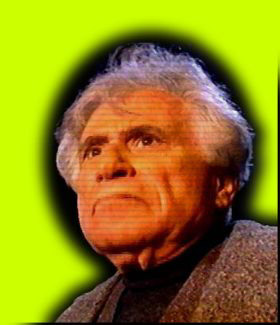
If Brother Theodore had died in Dachau, he would have been statistic number 6,000,001. If he had died in 1960, he would now be as famous as Lenny Bruce. If he had died in 1989, after his last appearance on Letterman, people would remember him now. But Brother Theodore is still alive, and waiting to die.
"I was a would-be playboy," Theodore says, "but Hitler had other ideas for me." Theodore Gottlieb was born into a wealthy Jewish family at precisely the wrong time. The Nazis came to power and seized the family fortune, forcing Theodore to sign his family's publishing and textile companies over for a single German mark. At age 32 he was allowed to walk out of Hitler's death camp, but his parents died.
Albert Einstein helped him immigrate to the United States (Theodore's mother had been Einstein's mistress). After losing thousands of dollars on a one-man show of spoken Edgar Allen Poe in 1947, he managed to meet Orson Welles (studio security guards thought he was a refugee director from Germany) but was bumped from the lead role in The Stranger thanks to a producer's fit of pique.
Fueled by depression and brilliance, he played a new one-man show to packed crowds at Carnegie Hall in the 1950s. Tired old Poe stories were replaced by grotesque and dark comedy. He would scream about the apocalypse and the terrible, bloody end of the world, then sigh wistfully and say "Boy, what a night."
Dubbed Brother Theodore by Merv Griffin, he appeared on Griffin's show over 30 times in the '70s and made more than 20 appearances on Late Night with David Letterman between 1980 and 1989.
But where has he been lately? Well, dying. Now 93, Brother Theodore is trapped in his tiny Manhattan studio apartment, "afraid of life, afraid of death, afraid of the nothingness between life and death." He can barely walk, can't wash a dish, cook, or go to the movies with his 45-year-old girlfriend. One more fall, he says, and he's dead. His hearing impairment makes watching TV all but impossible. "Television is a curse," he says "people watch it, miserable and alone, and see handsome, intelligent, wealthy young men playing around."
Surviving on a Screen Actors Guild pension and some money from his role in the 1989 Tom Hanks' film The 'Burbs, Theodore is still trying to work. Woody Allen wanted him for a film role two years ago, but the role would have required running for a cab. Theodore couldn't do it. A British TV camera crew recently came to his apartment and taped his monologue about throwing himself into the Hudson River and emerging in New Jersey as a beautiful swan. He handwrote a script for a new one-man show, but worries that the typist has vanished with it. "I phoned him at least three times. And when I say three times, I mean over a dozen times."
Like that of an existentialist Stephen Hawking, Theodore's brilliant mind is trapped in a twisted body. His pain is still funny and his comic timing is perfect. Worried that his girlfriend will leave him, he explains, "I have no idea what she sees in me. I would not want to make love to someone 45 years older than me. Of course, she would be 138." Upon seeing me, Theodore exclaims, "I'm old enough to be your great-grandmother!"
Theodore no longer follows comedy, and finds today's humor too complex. His jokes were born of a rueful innocence. He used to scream at audiences, calling them asses for laughing at a suicidal old man; then he would add, "The only thing that keeps me going is the hope of dying young."
Theodore will probably be alive for the millennium, but doesn't "give a hang about the future. In the future, there will be more machines, more advancement, but people will be poor and miserable...in seven years, I'll be dead."
"Or 100," I remind him.
"Or 100," he says.
Nick Mamatas is a New York writer currently living in exile in Jersey City. He writes regularly for The Greenwich Village Gazette and The Disinformation Company.
